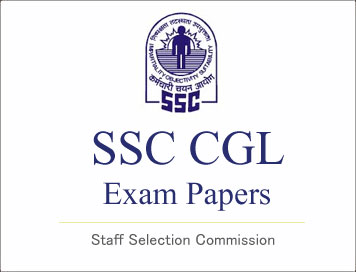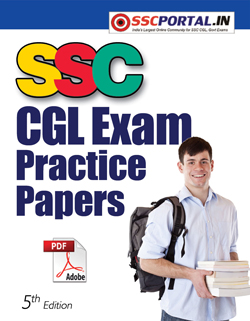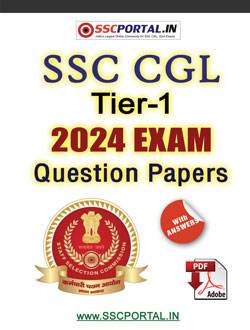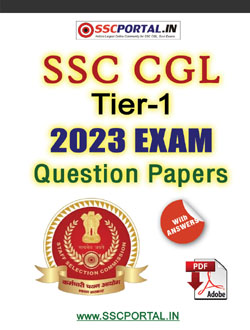NEW! SSC CGL PDF NOTES
SSC CGL (Tier - 1) Online Exam Paper - 2016 "held on 29 August 2016" Morning Shift (English Comprehension)
SSC CGL (Tier - 1) Online Exam Paper - 2016 "held on 29 August 2016" Morning Shift (English Comprehension)
Question 76.In the following question, out of the four alternatives, choose the word which best expresses the meaning of the given word and click the button corresponding to it.
DECIMATED
Options:
1) CAPTURED
2) DESTROYED
3) DAMAGED
4) WORRIED
Correct Answer: DESTROYED
Question 77.In the following question, out of the four alternatives, choose the word which is opposite in meaning to the given word and click the button corresponding to it.
INVINCIBLE
Options:
1) IMPREGNABLE
2) OMNIPRESENT
3) POWERLESS
4) POTENT
Correct Answer: POWERLESS
Question 78.Four words are given, out of which only one word is spelt correctly. Choose the correctly spelt word and click the button corresponding to it.
Options:
1) Diarrhoea
2) Diarhea
3) Diarrhea
4) Diarrohea
Correct Answer: Diarrhoea
Question 79.In the following questions, one part of the sentence may have an error. Find out which part of the sentence has an error and click the button corresponding to it. If the sentence is free from error, click the "No error" option.
It took her a long time(A)/to get off (B)/the death of her husband.(C)/No Error(D)
Options:
1) A
2) B
3) C
4) D
Correct Answer: B
(E-Book) SSC CGL (Tier-1) Exam Question Papers PDF with Ans Download
Click Here To Download Full PDF
DOWNLOAD SSC CGL (Tier-1) 2020 SOLVED Question Papers PDF (ENGLISH)
DOWNLOAD SSC CGL, CHSL, JE E-Books PDF
एसएससी - कर्मचारी चयन आयोग (सीजीएल) परीक्षा अध्ययन सामग्री
Study Kit for SSC CGL EXAM (English)
Question 80.In the following questions, one part of the sentence may have an error. Find out which part of the sentence has an error and click the button corresponding to it. If the sentence is free from error, click the "No error" option.
It is best(A)/ to be silent(B)/ than to speak in anger.(C)/No Error(D)
Options:
1) A
2) B
3) C
4) D
Correct Answer: A
Question 81.In the following questions, one part of the sentence may have an error. Find out which part of the sentence has an error and click the button corresponding to it. If the sentence is free from error, click the "No error" option.
His father is disgusted(A)/against him for his(B)/addiction to drink.(C)/No Error(D)
Options:
1) A
2) B
3) C
4) D
Correct Answer: B
Question 82.The sentences given with blanks are to be filled with an appropriate word(s). Four alternatives are suggested for each question. For each question, choose the correct alternative and click the button corresponding to it.
The aim of a Peace Council is ________ rather than cure.
Options:
1) salvation
2) preservation
3) maintenance
4) cultivation
Correct Answer: preservation
Question 83.The sentences given with blanks are to be filled with an appropriate word(s). Four alternatives are suggested for each question. For each question, choose the correct alternative and click the button corresponding to it.
He gives everyone _________ the class opportunities for practice.
Options:
1) at
2) in
3) of
4) on
Correct Answer: in
Question 84.The sentences given with blanks are to be filled with an appropriate word(s). Four alternatives are suggested for each question. For each question, choose the correct alternative and click the button corresponding to it.
Harish soon gained _________ in English.
Options:
1) provincialism
2) proficiency
3) efficiency
4) eminency
Correct Answer: proficiency
Question 85.In each of the questions, four alternatives are given for the Idiom/Phrase. Choose the alternative which best expresses the meaning of the Idiom/Phrase and click the button corresponding to it.
Beggar description
Options:
1) Cannot be described
2) Something described by a beggar
3) A poor account of something
4) A description of a beggar
Correct Answer: Cannot be described
Question 86.In each of the questions, four alternatives are given for the Idiom/Phrase. Choose the alternative which best expresses the meaning of the Idiom/Phrase and click the button corresponding to it.
Drag one's feet
Options:
1) Make someting more complicated
2) Expedite
3) Be reluctant to act
4) Stop working
Correct Answer: Be reluctant to act
Question 87.In each of the questions, four alternatives are given for the Idiom/Phrase. Choose the alternative which best expresses the meaning of the Idiom/Phrase and click the button corresponding to it.
Hope against hope
Options:
1) Think wishfully from time to time
2) Hoped with good reason
3) Nurture an impossible hope
4) Pretend to hope
Correct Answer: Nurture an impossible hope
Question 88.Out of the four alternatives, choose the one which can be substituted for the given words/sentences and click the button corresponding to it.
Lack of skill
Options:
1) Inertness
2) Insistence
3) Ineptness
4) Insolence
Correct Answer: Ineptness
Question 89.Out of the four alternatives, choose the one which can be substituted for the given words/sentences and click the button corresponding to it.
Stick with a thick end used in a mortar for pounding
Options:
1) Thistle
2) Stifle
3) Sceptre
4) Pestle
Correct Answer: Pestle
Question 90.Out of the four alternatives, choose the one which can be substituted for the given words/sentences and click the button corresponding to it.
An act when people vote in order to make a decision about a particular subject or policy rather than voting for a person
Options:
1) Election
2) Exit-poll
3) By-election
4) Referendum
Correct Answer: Referendum
Question 91.A sentence/a part of the sentence is underlined. Four alternatives are given to the underlined part which will improve the sentence. Choose the correct alternative and click the button corresponding to it. In case no improvement is needed, click the button corresponding to "No improvement".
Jane had told me that she hasn't done her homework.
Options:
1) told
2) tells
3) was telling
4) no improvement
Correct Answer: tells
Question 92.A sentence/a part of the sentence is underlined. Four alternatives are given to the underlined part which will improve the sentence. Choose the correct alternative and click the button corresponding to it. In case no improvement is needed, click the button corresponding to "No improvement".
This survey is concerning your health as well as that of your family.
Options:
1) concerns with
2) is concerned with
3) concerns to
4) no improvement
Correct Answer: is concerned with
Question 93.A sentence/a part of the sentence is underlined. Four alternatives are given to the underlined part which will improve the sentence. Choose the correct alternative and click the button corresponding to it. In case no improvement is needed, click the button corresponding to "No improvement".
A city that is set on a hill cannot be hidden.
Options:
1) be hid
2) hide
3) be hiding
4) no improvement
Correct Answer: no improvement
Question 94.A sentence/a part of the sentence is underlined. Four alternatives are given to the underlined part which will improve the sentence. Choose the correct alternative and click the button corresponding to it. In case no improvement is needed, click the button corresponding to "No improvement".
A black and white goat were grazing.
Options:
1) The white and the black goat
2) A black and a white goat
3) A black and a white goat
4) no improvement
Correct Answer: A black and a white goat
Question 95.A sentence/a part of the sentence is underlined. Four alternatives are given to the underlined part which will improve the sentence. Choose the correct alternative and click the button corresponding to it. In case no improvement is needed, click the button corresponding to "No improvement".
I had took the papers to John's office.
Options:
1) will took the papers
2) taken the papers
3) took the papers
4) no improvement
Correct Answer: took the papers
Question 96.A passage is given with 5 questions following it. Read the passage carefully and choose the best answer to each question out of the four alternatives and click the button corresponding to it.
"Tryst with Destiny" was a speech delivered by Jawaharlal Nehru, the first Prime Minister of independent India, to the Indian Constituent Assembly in Parliament, on 14th August 1947. It is considered to be one of the greatest speeches of all times and to be a landmark oration that captures the essence of the triumphant culmination of the largely non-violent Indian independence struggle against the British Empire in India.
"Long years ago we made a tryst with destiny, and now the time comes when we shall redeem our pledge, not wholly or in full measure, but very substantially. Freedom and power bring responsibility. The responsibility rests upon the assembly, a sovereign body representing the sovereign people of India. The service of India means the service of the millions who suffer. It means the ending of poverty and ignorance and disease and inequality of opportunity. We cannot encourage communalism or narrow-mindedness, for no nation can be great whose people are narrow in thought or in action.
To the people of India, whose representatives we are, this is no time for petty and destructive criticism, no time for ill will or blaming others. We have to build the noble mansion of free India where all her children may dwell".
To whom did Nehru deliver this famous speech?
Options:
1) Nehru delivered this speech to a massive Indian crowd in attendance.
2) Nehru delivered this speech to the members of the Constituent Assembly.
3) Nehru delivered this speech to the members of the Lok Sabha
4) Nehru delivered this speech to the members of the Rajya Sabha.
Correct Answer: Nehru delivered this speech to the members of the Constituent Assembly.
Question 97.A passage is given with 5 questions following it. Read the passage carefully and choose the best answer to each question out of the four alternatives and click the button corresponding to it.
"Tryst with Destiny" was a speech delivered by Jawaharlal Nehru, the first Prime Minister of independent India, to the Indian Constituent Assembly in Parliament, on 14th August 1947. It is considered to be one of the greatest speeches of all times and to be a landmark oration that captures the essence of the triumphant culmination of the largely non-violent Indian independence struggle against the British Empire in India.
"Long years ago we made a tryst with destiny, and now the time comes when we shall redeem our pledge, not wholly or in full measure, but very substantially. Freedom and power bring responsibility. The responsibility rests upon the assembly, a sovereign body representing the sovereign people of India. The service of India means the service of the millions who suffer. It means the ending of poverty and ignorance and disease and inequality of opportunity. We cannot encourage communalism or narrow-mindedness, for no nation can be great whose people are narrow in thought or in action.
To the people of India, whose representatives we are, this is no time for petty and destructive criticism, no time for ill will or blaming others. We have to build the noble mansion of free India where all her children may dwell".
Choose the answer which captures Nehru's belief.
Options:
1) Nehru believed that India could achieve perfection immediately.
2) Nehru said the India's struggle for freedom was new and sudden.
3) Nehru believed that India could take huge steps towards realising its dreams.
4) Nehru believed that India's dreams were too unrealistic.
Correct Answer: Nehru believed that India could take huge steps towards realising its dreams.
Question 98.A passage is given with 5 questions following it. Read the passage carefully and choose the best answer to each question out of the four alternatives and click the button corresponding to it.
"Tryst with Destiny" was a speech delivered by Jawaharlal Nehru, the first Prime Minister of independent India, to the Indian Constituent Assembly in Parliament, on 14th August 1947. It is considered to be one of the greatest speeches of all times and to be a landmark oration that captures the essence of the triumphant culmination of the largely non-violent Indian independence struggle against the British Empire in India.
"Long years ago we made a tryst with destiny, and now the time comes when we shall redeem our pledge, not wholly or in full measure, but very substantially. Freedom and power bring responsibility. The responsibility rests upon the assembly, a sovereign body representing the sovereign people of India. The service of India means the service of the millions who suffer. It means the ending of poverty and ignorance and disease and inequality of opportunity. We cannot encourage communalism or narrow-mindedness, for no nation can be great whose people are narrow in thought or in action.
To the people of India, whose representatives we are, this is no time for petty and destructive criticism, no time for ill will or blaming others. We have to build the noble mansion of free India where all her children may dwell".
The most dominant voice in the speech is
Options:
1) the voice of optimism
2) the voice of surrender
3) the voice of negligence
4) the voice of weakness
Correct Answer: the voice of optimism
Question 99.A passage is given with 5 questions following it. Read the passage carefully and choose the best answer to each question out of the four alternatives and click the button corresponding to it.
"Tryst with Destiny" was a speech delivered by Jawaharlal Nehru, the first Prime Minister of independent India, to the Indian Constituent Assembly in Parliament, on 14th August 1947. It is considered to be one of the greatest speeches of all times and to be a landmark oration that captures the essence of the triumphant culmination of the largely non-violent Indian independence struggle against the British Empire in India.
"Long years ago we made a tryst with destiny, and now the time comes when we shall redeem our pledge, not wholly or in full measure, but very substantially. Freedom and power bring responsibility. The responsibility rests upon the assembly, a sovereign body representing the sovereign people of India. The service of India means the service of the millions who suffer. It means the ending of poverty and ignorance and disease and inequality of opportunity. We cannot encourage communalism or narrow-mindedness, for no nation can be great whose people are narrow in thought or in action.
To the people of India, whose representatives we are, this is no time for petty and destructive criticism, no time for ill will or blaming others. We have to build the noble mansion of free India where all her children may dwell".
Select the answer which best reflects Nehru's point of view.
Options:
1) Nehru believed that Communalism would not be a problem.
2) Nehru believed that Communalism would be a positive force.
3) Nehru believed that Communalism would be dangerous for India.
4) Nehru believed that Communalism would make any nation great.
Correct Answer: Nehru believed that Communalism would be dangerous for India.
Question 100.A passage is given with 5 questions following it. Read the passage carefully and choose the best answer to each question out of the four alternatives and click the button corresponding to it.
"Tryst with Destiny" was a speech delivered by Jawaharlal Nehru, the first Prime Minister of independent India, to the Indian Constituent Assembly in Parliament, on 14th August 1947. It is considered to be one of the greatest speeches of all times and to be a landmark oration that captures the essence of the triumphant culmination of the largely non-violent Indian independence struggle against the British Empire in India.
"Long years ago we made a tryst with destiny, and now the time comes when we shall redeem our pledge, not wholly or in full measure, but very substantially. Freedom and power bring responsibility. The responsibility rests upon the assembly, a sovereign body representing the sovereign people of India. The service of India means the service of the millions who suffer. It means the ending of poverty and ignorance and disease and inequality of opportunity. We cannot encourage communalism or narrow-mindedness, for no nation can be great whose people are narrow in thought or in action.
To the people of India, whose representatives we are, this is no time for petty and destructive criticism, no time for ill will or blaming others. We have to build the noble mansion of free India where all her children may dwell".
What mansion did Nehru want to see built?
Options:
1) Nehru believed that the expensive mansion of India should be built.
2) Nehru believed that the honorable mansion of India should be built.
3) Nehru believed that the simple mansion of India should be built.
4) Nehru believed that the huge mansion of India should be built.
Correct Answer: Nehru believed that the honorable mansion of India should be built.








